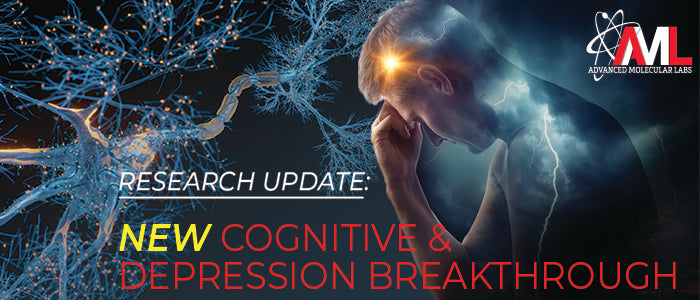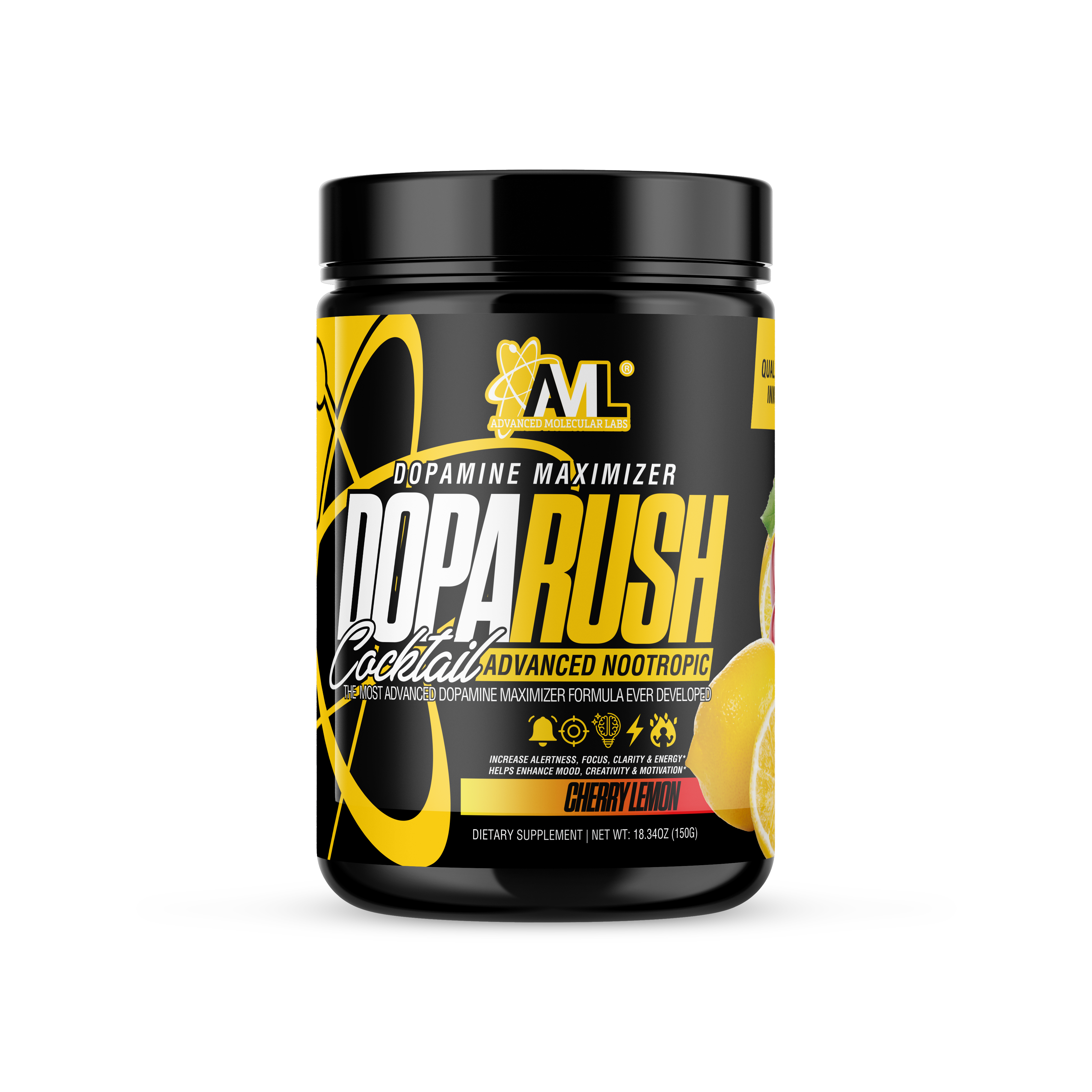


Choline Depression: Understanding CDP Choline Benefits
By Robert Schinetsky
Data indicates that the prevalence of dementia among older adults roughly doubles every 5 years. It is expected that approximately 131 million adults worldwide will be diagnosed with dementia by 2050.
Additionally, an estimated 10% to 15% of individuals with mild cognitive impairment (MCI) go on to develop dementia each year.
Currently, there is no cure for Alzheimer's dementia. There are just options for treating symptoms and attenuating the decline.
Common means of treating Alzheimer's include:
- Acetylcholinesterase inhibitors (e.g., donepezil)
- Choline precursors (e.g., Alpha-GPC, Choline Bitartrate)
- N-methyl-d-aspartic acid (NMDA) receptor antagonists (e.g., memantine, namenda)
While much research centers around acetylcholine (the "learning neurotransmitter"), the results have often fallen short of expectations, prompting scientists to explore other neurotransmitters as potential treatments for the disease.
One such neurotransmitter is norepinephrine (noradrenaline).
What is Norepinephrine and What Does it Do?
Norepinephrine is a catecholamine that functions in the brain and body as both a neurotransmitter and hormone.
It is synthesized from dopamine in the brain and plays a crucial role in the body's "fight or flight" response.
Norepinephrine is important for alertness, arousal, and attention, and it helps maintain blood pressure during periods of stress.
It also impacts learning, memory, executive function, and inhibitory control.
Noradrenaline & Dementia
A newly published meta-analysis and systematic review in the Journal of Neurology, Neurosurgery, and Psychiatry combed through 19 randomized control trials (that included a total of ~1300 patients) to assess the potential benefit of noradrenaline-enhancing compounds.[5]
Based on their analysis, the team of researchers concluded that "pharmacotherapies targeting the noradrenergic system can improve cognition and apathy" in individuals with dementia or mild cognitive impairment induced by Alzheimer's disease.[5]
One of the reasons norepinephrine was investigated as a treatment route is that apathy and lack of motivation are common features of Alzheimer's disease.
Researchers noted that while noradrenaline-focused pharmacotherapies could improve cognition and apathy, they did not significantly improve attention or episodic memory.

Based on this, it may be beneficial to test combination therapies involving both noradrenergic and cholinergic agents.
However, it's important to consider that many pharmaceuticals used to combat Alzheimer's dementia involve risks of their own.
For instance, drugs targeting noradrenergic reuptake inhibition and agonism have the potential to increase heart rate, blood pressure, and cardiac risk.
Additionally, acetylcholine-focused pharmacotherapies, such as donepezil, have been known to lead to adverse effects, including gastrointestinal distress, insomnia, and hypertension.[6]
Additional Concerns Regarding Choline Supplements
Choline supplements have gained considerable popularity in recent years, and have been seen in an ever-increasing number of pre workout supplements. The role of choline and depression is also being explored in various studies.
After all, choline is an essential brain nutrient, and since acetylcholine plays such a prominent role in cognition and learning, it's only natural that research has identified it as an important factor in Alzheimer's.
However, a recent 10-year cohort study including over 12 million individuals (50 years or older) indicated that the use of Alpha-GPC was significantly associated with a 10-year incident stroke risk in a dose-responsive manner.[7]
More specifically, individuals consuming Alpha-GPC had a 46% higher risk of stroke compared to those who did not, raising concerns about its implications for choline depression.
The reason for this increased risk of cardiovascular-related events may be due to TMAO -- a metabolite of choline, carnitine, and betaine metabolism.
Previous studies have shown that high levels of TMAO are associated with the risk of hemorrhagic stroke among patients with hypertension.
It's important to note that certain forms of choline supplements lead to higher increases in TMAO than others.
For example, choline bitartrate (the most common form of choline supplement) leads to three times greater plasma levels of TMAO compared to phosphatidylcholine or no choline.[9] The choline in citicoline (CDP-choline) seems to be less prone to TMAO conversion.[12]
Eggs are a natural source of choline and appear to be a safer option for those concerned about the TMAO-cardiovascular incident connection.
Research has found that consuming two eggs per day for four weeks resulted in higher dietary and plasma choline concentrations, and improved markers of cardiovascular disease risk without affecting TMAO concentrations compared to an oatmeal breakfast.[10]

More recent research in healthy participants found that consuming four eggs daily showed no significant increase in TMAO or platelet reactivity. However, choline bitartrate supplements providing comparable total choline raised both TMAO and platelet reactivity, which could have implications for choline for depression management.[11]
The bottom line is that instead of relying on supplements to meet your choline requirements, obtaining it through the diet may be the safer route.
Norepinephrine, Not Serotonin for Depression
When you hear about depression, it's common to think of low serotonin levels. This association has been reinforced through pharmaceutical advertising for decades. In fact, the link between low serotonin and depression dates back to the 1960s.[13]
To correct this chemical imbalance, selective-serotonin reuptake inhibitors (SSRIs) are commonly prescribed. However, many are now considering alternatives that focus on other neurotransmitters.
However, a growing body of evidence disputes the low serotonin-depression link, and more attention is being paid to other neurotransmitters that could help those suffering from depression, namely norepinephrine and/or dopamine.[17,18]
Recent research published in Cognitive, Affective, & Behavioral Neuroscience finds that dopamine modulation could repair motivational deficits elicited by stress.[18]
A large-scale review encompassing existing meta-analyses and systematic reviews from University College London concluded that:
"The huge research effort based on the serotonin hypothesis has not produced convincing evidence of a biochemical basis to depression."[14]
The team of researchers believes these findings are critically important, as other research indicates that as many as 85-90% of the public believes depression is caused by low serotonin or a chemical imbalance.
Interestingly, during their analysis, the team found evidence that individuals who used antidepressants actually had lower levels of serotonin in their blood!
This led them to conclude that long-term antidepressants may actually reduce serotonin concentrations.
The reason for this, according to the researchers, is that the boost in serotonin from antidepressants is short-term and may lead to compensatory changes in the brain that produce the opposite effect in the long term.
Lead researcher on the landmark paper, Joanna Moncrieff, noted[15]:
"Our view is that patients should not be told that depression is caused by low serotonin or by a chemical imbalance, and they should not be led to believe that antidepressants work by targeting these unproven abnormalities. We do not understand what antidepressants are doing to the brain exactly, and giving people this sort of misinformation prevents them from making an informed decision about whether to take antidepressants or not."
Something else to consider is that SSRIs come with a laundry list of adverse effects, including[16]:
- Nausea
- Insomnia
- Anxiety
- Agitation
- Weight gain
- Sexual dysfunction
Choline and Depression: A New Perspective
The potential link between choline and depression is gaining interest in the scientific community. Choline, a vital nutrient for brain health, may have a role in mood regulation and cognitive function. While traditional treatments for depression often focus on serotonin, exploring the impact of choline could open new avenues for managing this condition.
Choline is involved in the synthesis of acetylcholine, a neurotransmitter associated with memory and learning. This connection suggests that choline supplements might offer benefits beyond cognitive enhancement, potentially influencing mood and emotional well-being.
Although more research is needed, some studies suggest that adequate choline intake could support mental health. This is particularly relevant for individuals experiencing choline depression, where choline levels might influence depressive symptoms.
Incorporating choline-rich foods like eggs, liver, and soybeans into the diet, or considering supplements, could be a proactive approach to support both cognitive and emotional health. However, as with any supplement, it's crucial to consult with a healthcare professional before making significant changes to your regimen.
Takeaway
As we've discussed above and in previous articles, taking pharmaceuticals that artificially inflate various neurotransmitters isn't sustainable over the long-term. They may improve things transiently, but at the end of the day there are adverse effects.
DopaRush® and Dopa Rush Shots offer a natural alternative and contain caffeine and tyrosine, providing the key building blocks needed to support dopamine and norepinephrine.†
†These statements have not been evaluated by the U.S. Food and Drug Administration.
This product is not intended to diagnose, treat, cure or prevent any disease.
©Published by Advanced Research Media, Inc. 2022
©Reprinted with permission from Advanced Research Media, Inc.
References
- Prince M, Comas-HerreraA, KnappM, GuerchetM, KaragiannidouM. World Alzheimer report 2016: improving healthcare for people living with dementia: coverage, quality and costs now and in the future. September 21, 2016. Accessed October 21, 2021
- https://www.alz.org/alzheimers-dementia/facts-figures
- Dahl MJ, Mather M, Werkle-Bergner M. Noradrenergic modulation of rhythmic neural activity shapes selective attention. Trends Cogn Sci 2022;26:38-52
- Holland N, Robbins TW, Rowe JB. The role of noradrenaline in cognition and cognitive disorders. Brain 2021;144:2243-2256 https://doi.org/
- David MCB, Del Giovane M, Liu KY, et al. Cognitive and neuropsychiatric effects of noradrenergic treatment in Alzheimer's disease: systematic review and meta-analysisJournal of Neurology, Neurosurgery & Psychiatry Published Online First: 05 July 2022. doi: 10.1136/jnnp-2022-329136
- Kumar A, Gupta V, Sharma S. Donepezil. [Updated 2021 Dec 22]. In: StatPearls [Internet]. Treasure Island (FL): StatPearls Publishing; 2022 Jan-. Available from: https://www.ncbi.nlm.nih.gov/books/NBK513257/
- Lee G., Choi S., Chang J., Choi D., Son J.S., Kim K., Kim S.M., Jeong S., Park S.M. Association of L-alpha Glycerylphosphorylcholine With Subsequent Stroke Risk After 10 Years. JAMA Netw. Open. 2021;4:e2136008. doi: 10.1001/jamanetworkopen.2021.36008
- Wang Z, Hazen J, Jia X, et al. The Nutritional Supplement L-Alpha Glycerylphosphorylcholine Promotes Atherosclerosis. Int J Mol Sci. 2021;22(24):13477. Published 2021 Dec 15. doi:10.3390/ijms222413477
- Cho CE, Aardema NDJ, Bunnell ML, Larson DP, Aguilar SS, Bergeson JR, Malysheva OV, Caudill MA, Lefevre M. Effect of Choline Forms and Gut Microbiota Composition on Trimethylamine-N-Oxide Response in Healthy Men. Nutrients. 2020 Jul 25;12(8):2220. doi: 10.3390/nu12082220. PMID: 32722424; PMCID: PMC7468900.
- Missimer A., Fernandez M.L., DiMarco D.M., Norris G.H., Blesso C.N., Murillo A.G., Vergara-Jimenez M., Lemos B.S., Medina-Vera I., Malysheva O.V., et al. Compared to an oatmeal breakfast, two eggs/day increased plasma carotenoids and choline without increasing trimethyl amine n-oxide concentrations. J. Am. Coll. Nutr. 2018;37:140- doi: 10.1080/07315724.2017.1365026.
- Wilcox J, Skye SM, Graham B, Zabell A, Li XS, Li L, Shelkay S, Fu X, Neale S, O'Laughlin C, Peterson K, Hazen SL, Tang WHW. Dietary Choline Supplements, but Not Eggs, Raise Fasting TMAO Levels in Participants with Normal Renal Function: A Randomized Clinical Trial. Am J Med. 2021 Sep;134(9):1160-1169.e3. doi: 10.1016/j.amjmed.2021.03.016. Epub 2021 Apr 17. PMID: 33872583; PMCID: PMC8410632
- Synoradzki K, Grieb P. Citicoline: A Superior Form of Choline? Nutrients. 2019 Jul 12;11(7):1569. doi: 10.3390/nu11071569. PMID: 31336819; PMCID: PMC6683073.
- Coppen A. The biochemistry of affective disorders. Br J Psychiatry. 1967;113:1237-64.
- Joanna Moncrieff, Ruth E. Cooper, Tom Stockmann, Simone Amendola, Michael P. Hengartner, Mark A. Horowitz. The serotonin theory of depression: a systematic umbrella review of the evidence. Molecular Psychiatry, 2022; DOI: 1038/s41380-022-01661-0
- University College London. "No evidence that depression is caused by low serotonin levels, finds comprehensive review." ScienceDaily. ScienceDaily, 20 July 2022. <sciencedaily.com/releases/2022/07/220720080145.htm>
- Ferguson JM. SSRI Antidepressant Medications: Adverse Effects and Tolerability. Prim Care Companion J Clin Psychiatry. 2001 Feb;3(1):22-27. doi: 10.4088/pcc.v03n0105. PMID: 15014625; PMCID: PMC181155.
- Moret C, Briley M. The importance of norepinephrine in depression. Neuropsychiatr Dis Treat. 2011;7(Suppl 1):9-13. doi: 10.2147/NDT.S19619. Epub 2011 May 31. PMID: 21750623; PMCID: PMC3131098.
- Lamontagne, S.J., Wash, S.I.J., Irwin, S.H. et al. Effects of dopamine modulation on chronic stress-induced deficits in reward learning. Cogn Affect Behav Neurosci 22, 736-753 (2022). https://doi.org/10.3758/s13415-022-01001-3







